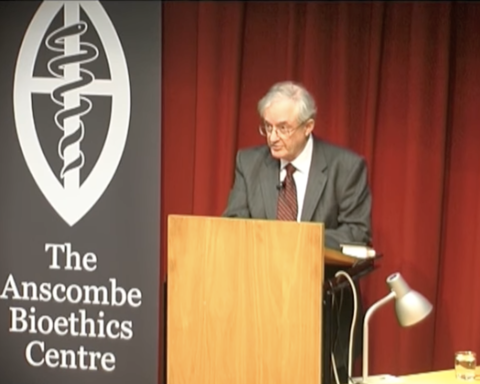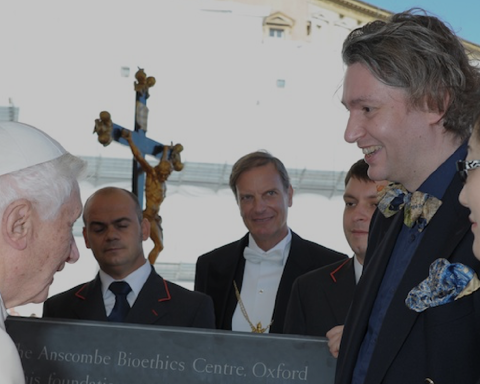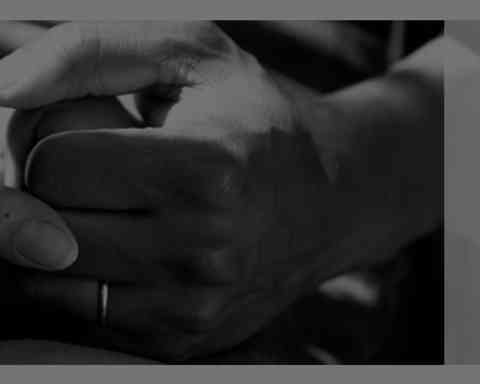Press Statement – Pippa Knight: The Benefit of Being Cared for Unawares
Pippa Knight: The Benefit of Being Cared for UnawaresOn 8 January 2021, an English court again declared that life-sustaining treatment must be withdrawn from a severely disabled child, despite the wishes of her mother that the child be allowed to live.
The case of Pippa Knight has similarities to the earlier cases of Charlie Gard and Alfie Evans where ventilation was withdrawn against the wishes of their parents.
It is important to state that the withdrawal of life-sustaining treatment can be justifiable when it no longer serves its purpose or when it is excessively burdensome to the patient or others in relation to the prospect of benefit. On the other hand, withdrawal of life-sustaining treatment when treatment would have been beneficial and not unduly burdensome is nothing less than abandonment. Furthermore, even if withdrawal of treatment is justifiable it is important that the decision is made for the right reasons. In the case of Pippa Knight, as in the two former cases, the ethical reasoning is deeply flawed.
A double standard in weighing up burdens and benefits of treatment
Pippa Knight, aged 5, is currently in the Paediatric Intensive Care Unit (PICU) at St George’s Hospital, London. The consensus of medical experts is that Pippa probably feels no pain and experiences no pleasure, that she is not conscious of her environment, and that there is no prospect of improvement in her condition. After two years in PICU the doctors argued that Pippa’s ventilation should be withdrawn. Her mother argued instead for a trial of portable ventilation, and a tracheostomy, in the hope that Pippa could be discharged from hospital and cared for at home. The judge in this case ruled against the mother, declaring that:
- Pippa should not be provided with a tracheostomy.
- Mechanical ventilation should be withdrawn.
- There should be clearly defined limits on the treatment provided to Pippa after that withdrawal of ventilation, “with the effect that she would be allowed to die”.
The judge based his judgement on the belief that “a young child with no conscious awareness suffers burdens but enjoys no benefits from the prolongation of life”.
In some ways this claim marks a move away from the very subjective account of some previous judgements. In the past it had sometimes been claimed that a person who is permanently unconscious can neither experience burdens nor benefits from treatment. In contrast, the judge in this case argued that loss of function is something that is suffered. On the same basis, he argued that invasive treatments such as mechanical ventilation “constitute objectively identifiable burdens” even if someone was not aware of the burden. Both these claims seem correct, though it is important that the burdens of treatments are judged by the difference they make to a person, and that no-one’s life be judged devoid of value whether or not the person carries the burdens of a disability.
Having recognised that invasive treatment is an objective burden, even if the person is unaware of it, the judge applied a double standard. He failed to recognise that sustaining life, and sustaining functions such as respiration and nutrition are also objective benefits even to someone who is not aware of the benefit. He admitted that the law “recognises the inherent value of Pippa’s life by giving considerable weight to its preservation”. However, he contradicted this by stating that he “cannot find any palpable or impalpable benefit to Pippa from prolonging her life”. This ignores the fact that preserving, prolonging, protecting, or sustaining life is itself a palpable benefit. Pippa is not aware of this benefit but neither is she aware of the burdens. There is a clear double standard in the statement that “she gains no benefit from life but she daily bears the dual burdens of her profoundly disabling condition and the intensive treatment”. Either she neither gains benefits nor bears burdens, for she experiences neither, or she both gains benefits and bears burdens despite experiencing neither. The judge was somewhat aware of this inconsistency and so allowed some objective benefits that would hold for older children in relation to autonomy. However, he maintained a double standard in relation to bodily burdens and benefits.
A still more serious error is that the judge failed to recognise that there is an objective benefit in receiving care from a loved one in your own home. At one point the judge acknowledged that “home care is a goal that, as a much-loved five-year old girl, Pippa would be likely to share”. This is, however, more than a goal she would likely share. It constitutes an objectively identifiable benefit for Pippa as the much-loved daughter she is. The aim of providing care for Pippa at home might not be achievable in practice. This cannot be known with certainty unless it is attempted. What can be known is that such care would be a benefit if achieved, and it is one that is prevented by the double standard applied by the judge in this case.
The judgement marks an advance in not seeking to reduce burdens and benefits of treatment to the experience of pains and pleasures, but this is not applied equally to burdens and to benefits. Once it is acknowledged that there can be real burdens to treatment in the case of a patient who is not aware of them, it should also be acknowledged that there may be a range of benefits that can be gained: not only the benefits of sustaining life and bodily health but also the relational benefits of receiving care in the midst of a loving family.
The right of a child to be cared for by her mother
The United Nations Convention on the Rights of the Child states that the child shall have, as far as possible, the right to “be cared for by his or her parents”. The right of Pippa to be cared for by her mother, as far as possible, includes the right of Pippa to have her mother make decisions in relation to her care. It is a right that is violated when decisions are taken out of the hands of her mother without very serious reason. It is important to note that this is not only or even primarily a right of a parent, but a right of a child to have a parent act for them, and thus a duty on the state to respect the role of the child’s parent. In extreme cases the state may step in, but it should not usurp the role of the parent unless it can show the parent is being clearly unreasonable such that the child is in danger.
This principle is accepted in English law when it comes to issues of child protection and taking children into care. However, in relation to medical decision-making the law has been seriously distorted by a previous judgement in which Justice Holman stated that the wishes of parents “are wholly irrelevant to consideration of the objective best interests of the child”. This sweeping statement now has to be qualified, thanks to the judgement of the European Court of Human Rights in the case of Charlie Gard. However, English judges still struggle to recognise that respecting the decision of the parent is respecting the right of the child to be cared for by their parent, as far as possible.
It should also be noted that in this case there were differences of medical opinion among experts. There was agreement that Pippa’s condition had been static for well over a year and that there is no prospect of any improvement. There was agreement that care for Pippa at home would not be straightforward. At best it would be risky and it might not be medically possible. Nevertheless, more than one doctor was of the opinion that it was at least worth trying, given that the alternative was immediate withdrawal of ventilation.
Perhaps the most hopeful aspect of this case is that one doctor who testified on behalf of the mother had previously testified in favour of withdrawal of ventilation against the wishes of the parents, in the case of Tafida Raqeeb. In that case the court decided in favour of the parents. As a result of this experience, the doctor had thought again and had come to a different view in relation to these extreme cases. Such changes of heart are unusual and it clearly made an impression upon the judge, though was not enough to persuade him.
Given that medical experts took different views it was clearly reasonable for Pippa’s mother to seek to follow the opinion that accorded with her view of the child’s best interests. It is unjust in such a case for the judge to take this decision away from her.
On the other hand, while Pippa’s mother has a right to seek a second opinion and to seek treatment for her child where she can, this does not guarantee that she will find a hospital trust willing to fund care at home. The issue of funding was one to which the judge in this case alluded several times. He noted that “there is currently no funding in place for a sufficient package of home care” and contrasted this with Tafida Raqeeb where there was a “fully thought out and funded care plan” to move Tafida to be cared for by her family at home on a ventilator. However, if the question is really one of resources this should be faced honestly and directly and not introduced indirectly into a “best interest decision” by saying that the decision must be “feasible”.
The decision of the High Court is currently under appeal. It remains to be seen whether this deeply flawed decision will be overturned. Whatever the legal outcome, the staff of the Anscombe Bioethics Centre wish to express our solidarity with Pippa, her mother and all her family as they go through this deeply painful time and assure them of our prayers for Pippa and for those around her.
[1] Guy’s and St Thomas’ Children’s NHS Foundation Trust & Anor v Knight & Anor [2021] EWHC 25 (Fam).
[2] Ibid., 2. The Anscombe Bioethics Centre, Press Statement, Charlie Gard: Doing the right thing for the right reasons, 5 July 2017: https://bioethics.org.uk/press-room/press-statements/press-statement-charlie-gard-doing-the-right-thing-for-the-right-reasons/
[3] Ibid., 2. The Anscombe Bioethics Centre, Press Statement, Alfie Evans: A Brief Statement of the Fundamental Ethical Principles, 2 February 2018: https://bioethics.org.uk/press-room/press-statements/press-statement-alfie-evans-a-brief-statement-of-the-fundamental-ethical-principles/
[4] The Ethics of Care of the Dying Person, Anscombe Bioethics Centre, 2013: https://bioethics.org.uk/educational-resources/guides-publications/the-ethics-of-care-of-the-dying-person/
[5] Op. cit., [2021] EWHC 25, 2, though some acknowledged that the possibility of awareness could not be excluded absolutely e.g [2021] EWHC 25, 82.
[6] Ibid., 3.
[7] Ibid., 2, 113. Despite claims elsewhere in the judgment the phrasing of the last point implies that “allowing her to die” is the intention of the withdrawal, in which case, it constitutes passive euthanasia.
[8] Ibid., 25, 88.
[9] Ibid.
[10] Ibid., 25, 84 see also 57, 71.
[11] Ibid., 25, 88 see also 103c, 106.
[12] Ibid., 25, 90.
[13] Ibid., 25, 88.
[14] Ibid., 25, 105.
[15] Article 7.
[16] Op. cit., [2021] EWHC 25, 22 quoting Holman J in An NHS Trust v MB [2006] EWHC 507, 16.
[17] Ibid., 25, 98 quoting Gard and Others v. the United Kingdom [2017] ECHR 605.
[18] Barts Health NHS Trust v Raqeeb [2019] EWHC 2531 (Admin).
[19] Op. cit., [2021] EWHC 25, 80.
[20] Ibid., 25, 49e.
[21] Ibid., 25, 87.
[22] Ibid., 25, 87 see also 49, 64, 49.
Most recent
Anscombe Centre Tribute to John Finnis Upon His CBE Appointment
04 January 2023
The Anscombe Bioethics Centre pays tribute to John Finnis, Professor of Law and Legal Philosophy Eme...
The Anscombe Centre Honours the Memory of the Late Pope Benedict XVI (1927-2022)
03 January 2023
The Anscombe Bioethics Centre would like to honour the memory of the late Pope Benedict XVI. His wit...
Anscombe Centre Statement on Commons HSC Committee Inquiry into Assisted Suicide
15 December 2022
The Anscombe Bioethics Centre comments on the new Inquiry launched by the House of Commons Health an...
Sincerest Thanks for Your Support
Staff are grateful to all those who sustained the Centre in the past by their prayers and the generous financial support from trusts, organisations, communities and especially from individual donors, including the core funding that came through the Day for Life fund and so from the generosity of many thousands of parishioners. We would finally like to acknowledge the support the Centre has received from the Catholic community in Ireland, especially during the pandemic when second collections were not possible.
We would like to emphasise that, though the Centre is now closed, these donations have not been wasted but have helped educate and support generations of conscientious healthcare professionals, clerics, and lay people over almost 50 years. This support has also helped prevent repeated attempts to legalise euthanasia or assisted suicide in Britain and Ireland from 1993 till the end of the Centre’s work on 31 July 2025.



